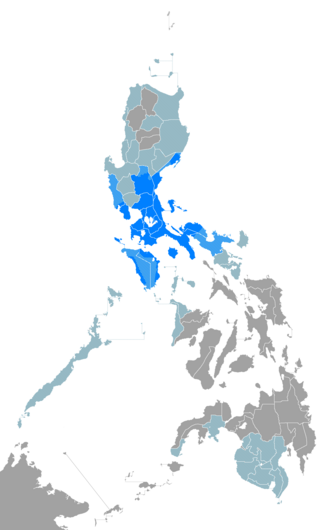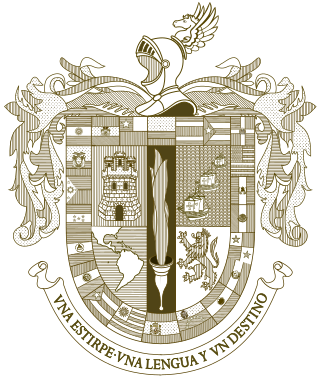Related Research Articles

Tagalog is an Austronesian language spoken as a first language by the ethnic Tagalog people, who make up a quarter of the population of the Philippines, and as a second language by the majority. Its standardized form, officially named Filipino, is the national language of the Philippines, and is one of two official languages, alongside English.

The Royal Spanish Academy is Spain's official royal institution with a mission to ensure the stability of the Spanish language. It is based in Madrid, Spain, and is affiliated with national language academies in 22 other Hispanophone nations through the Association of Academies of the Spanish Language. The RAE's emblem is a fiery crucible, and its motto is Limpia, fija y da esplendor.
The interrobang, also known as the interabang‽, is an unconventional punctuation mark intended to combine the functions of the question mark and the exclamation mark. The glyph is a ligature of these two marks and was first proposed in 1962 by Martin K. Speckter.

A pop icon is a celebrity, character, or object whose exposure in popular culture is regarded as constituting a defining characteristic of a given society or era. The usage of the term is largely subjective since there are no definitively objective criteria. The categorization is usually associated with elements such as longevity, ubiquity and distinction. Moreover, "pop icon" status is distinguishable from other kinds of notoriety outside pop culture, such as with historic figures. Some historic figures are recognized as having reached "pop icon" status during their era, and such status may continue into the present. Pop icons of previous eras include Benjamin Franklin and Mozart.

Leísmo is a dialectal variation in the Spanish language that occurs largely in Spain. It involves using the indirect object pronouns le and les in place of the direct object pronouns lo, la, los, and las, especially when the direct object refers to a male person or people.

In Spanish dialectology, the realization of coronal fricatives is one of the most prominent features distinguishing various dialect regions. The main three realizations are the phonemic distinction between and, the presence of only alveolar, or, less commonly, the presence of only a denti-alveolar that is similar to.

The Association of Academies of the Spanish Language is an entity whose end is to work for the unity, integrity, and growth of the Spanish language. It was created in Mexico in 1951 and represents the union of all the separate academies in the Spanish-speaking world. The association publishes reference works on the Spanish language and commemorative editions of Hispanic literature, among other publications.

Fidel is a 2002 mini-series by David Attwood that describes the Cuban revolution and political career of Fidel Castro. The total duration of the film is 200 minutes, but the video-version is shorter. Gael García Bernal would later reprise his role as Che Guevara in the film The Motorcycle Diaries.

Spanish orthography is the orthography used in the Spanish language. The alphabet uses the Latin script. The spelling is fairly phonemic, especially in comparison to more opaque orthographies like English, having a relatively consistent mapping of graphemes to phonemes; in other words, the pronunciation of a given Spanish-language word can largely be predicted from its spelling and to a slightly lesser extent vice versa. Spanish punctuation includes the use of inverted question and exclamation marks: ⟨¿⟩⟨¡⟩.
The Third International Congress of the Spanish Language was a cultural event that took place in Rosario, Argentina, on November 17-19, 2004.

Standard Spanish, also called the norma culta, 'cultivated norm', refers to the standard, or codified, variety of the Spanish language, which most writing and formal speech in Spanish tends to reflect. This standard, like other standard languages, tends to reflect the norms of upper-class, educated speech. There is variation within this standard, such that one may speak of the Mexican, Latin American, Peninsular or European, and the Rioplatense standards, in addition to the standard forms developed by international organizations and multinational companies.
The following is a list of Spanish exonyms, Spanish names for places that do not speak Spanish.

People from the United States of America are known as and refer to themselves as Americans. Different languages use different terms for citizens of the United States. All forms of English refer to US citizens as Americans, a term deriving from the United States of America, the country's official name. In the English context, it came to refer to inhabitants of British America, and then the United States. There is some linguistic ambiguity over this use due to the other senses of the word American, which can also refer to people from the Americas in general. Other languages, including French, Japanese, and Russian, use cognates of American to refer to people from the United States, while others, particularly Spanish and Portuguese, primarily use terms derived from United States or North America. There are various other local and colloquial names for Americans. The name America came from the Italian navigator Amerigo Vespucci.

The Diccionario de la lengua española (DLE); is the authoritative dictionary of the Spanish language. It is produced, edited and published by the Royal Spanish Academy, with the participation of the Association of Academies of the Spanish Language. It was first published in 1780, as the Diccionario de la lengua castellana and subsequent editions have been published about once a decade. The twenty-third edition was published in 2014; it is available on-line, incorporating modifications to be included in the twenty-fourth print edition.
The Academia Argentina de Letras is the academy in charge of studying and prescribing the use of the Spanish language in Argentina. Since its establishment, on August 13, 1931, it has maintained ties with the Royal Spanish Academy and the other Spanish-language academies that are members of the Association of Spanish Language Academies. Since 1999, it has officially been a correspondent academy of the Royal Spanish Academy.

Feminist language reform has proposed gender neutrality in languages with grammatical gender, such as Spanish. Grammatical gender in Spanish refers to how Spanish nouns are categorized as either masculine or feminine. As in other Romance languages—such as Portuguese, to which Spanish is very similar—a group of both men and women, or someone of unknown gender, is usually referred to by the masculine form of a noun and/or pronoun. Advocates of gender-neutral language modification consider this to be sexist, and exclusive of gender non-conforming people. They also stress the underlying sexism of words whose feminine form has a different, often less prestigious meaning. Some argue that a gender neutral Spanish can reduce gender stereotyping, deconstructing sexist gender roles and discrimination in the workplace.

Stress in Spanish is functional: to change the placement of stress changes the meaning of a sentence or phrase: for example, célebre ('famous'), celebre, and celebré contrast only by stress. There is some minor variance between Spanish dialects; a speaker of Rioplatense Spanish will pronounce boina ('beret') as while a speaker of Colombian Spanish will pronounce it as.

The Tesoro de la lengua castellana o española is a dictionary of the Spanish language, written by Sebastián de Covarrubias in 1611.

María Lourdes Carlé is an Argentine professional tennis player. She has a career-high WTA singles ranking of world No. 140 achieved on 12 June 2023 and a doubles ranking of No. 136 achieved on 25 July 2022.
References
- ↑ Bonnin, Juan Eduardo. Decentralization of the linguistic norm online: the Royal Spanish Academy challenged on the Internet. Tilburg University, Oct. 2012, p. 5.
- ↑ ""Las 22 Academias de la Lengua Española aprueban el Diccionario Panhispánico de Dudas", EROSKI CONSUMER, 14 Oct. 2004". Consumer.es. 2004-10-14. Retrieved 2013-11-28.